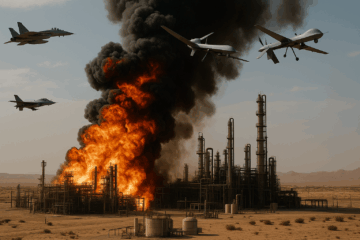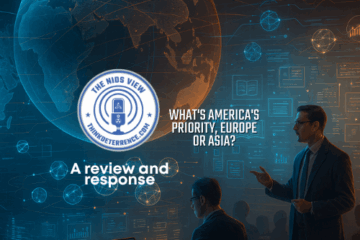Executive Summary: Week of December 8, 2024
This report asserts that the United States is at a critical inflection point in global security, facing mounting threats from an increasingly assertive China, a resurgent Russia, and a shifting nuclear landscape characterized by rapid technological advancements and diminished international agreements. This week we underscore the critical juncture at which the US finds itself—facing nuclear, economic, and strategic challenges requiring unwavering resolve and bipartisan cooperation. Here are some highlights:
Quotes of the Week
- Chelsey Wiley (IISS): “US–China tensions could lead to heightened security concerns for allies.”
- Editor’s note: The focus must remain on countering China’s threats, not shifting blame to the US.
- Admiral Tony Radakin (UK): “The third nuclear era is more complex, with proliferating technologies and absent security architectures.”
- Palantir CEO: “Adversaries need to wake up scared; peace comes through strength.”
- Rep. Chuck Fleischmann (R-TN): “Modernizing our nuclear deterrent ensures the US remains the global superpower.”
Essay of the Week
“Call it Chinese Communist Imperialism” by Christopher Ford (NIPP)
- Explores China’s military expansion and its quest for global influence.
- Highlights its nuclear ambitions and parallels with historical imperialism.
- Advocates for robust US policies to counter these threats.
Congressional Update
- FY25 NDAA: Approved at $895 billion, fully funding nuclear initiatives and strengthening deterrence.
- Key provisions:
- Full funding for ICBMs and submarine components of the TRIAD.
- Establishment of a unified Assistant Secretary for Nuclear Matters.
- New Congressional Members:
- 78 new members, with significant additions to defense committees.
- Focus on battleground states with strategic implications for military readiness.
Strategic Developments
- China’s Nuclear Expansion:
- Accelerating development of fast-breeder reactors for weapons-grade plutonium.
- Collaboration with Russia raises global security concerns.
- CSIS Wargaming:
- Highlights the risk of nuclear escalation in a Taiwan conflict.
- Diplomacy and readiness key to preventing catastrophe.
- Third Nuclear Age:
- UK and US emphasize increasing complexity in global nuclear threats from China, Russia, Iran, and North Korea.
Reagan Defense Forum: Key Takeaways
- Panel 1: Indo-Pacific Challenges
- Admiral Paparo stressed the urgency of deterrence in the face of China’s ambitions toward Taiwan.
- Marine Corps General Eric Smith: “What would you pay not to lose a war? Everything and anything.”
- Panel 2: Innovation in Defense
- Heidi Shu: Encouraged bolstering supply chains and supporting small, innovative companies.
- Senator Todd Young: Warned about biological threats and vulnerabilities tied to US-China economic ties.
- Peace Through Strength:
- Reinforced the need for defense investment to deter adversaries and maintain global stability.
- Palantir CEO emphasized America’s role as a dominant power, inspiring both fear in adversaries and confidence in allies.
Read The Full Report
About the Author

Peter Huessy
Mr. Peter Huessy is President of his own defense consulting firm, Geostrategic Analysis, founded in 1981, and through 2021, Director of Strategic Deterrent Studies at the Mitchell Institute on Aerospace Studies. He was the senior defense consultant at the National Defense University Foundation for 22 years. He was the National Security Fellow at the AFPC, and Senior Defense Consultant at the Air Force Association from 2011-2016.
Mr. Huessy has served as an expert defense and national security analyst for over 50 years, helping his clients cover congressional activities, arms control group efforts, nuclear armed states actions, and US administration nuclear related policy, budgets, and strategies, while monitoring budget and policy developments on nuclear deterrence, ICBM modernization, nuclear arms control, and overall nuclear modernization.
He has also covered nuclear terrorism, counterterrorism, immigration, state-sponsored terrorism, missile defense, weapons of mass destruction, especially US-Israeli joint defense efforts, nuclear deterrence, arms control, proliferation, as well as tactical and strategic air, airlift, space and nuclear matters and such state and non-state actors as North Korea, China, Iran, Syria, Venezuela and Hezbollah, Hamas, and Al Qaeda. This also includes monitoring activities of think tanks, non-governmental organizations, and other US government departments, as well as projecting future actions of Congress in this area. His specialty is developing and implementing public policy campaigns to secure support for important national security objectives. And analyzing nuclear related technology and its impact on public policy, a study of which he prepared for the Aerospace Corporation in 2019.



